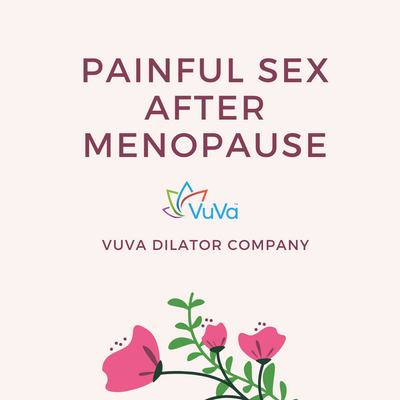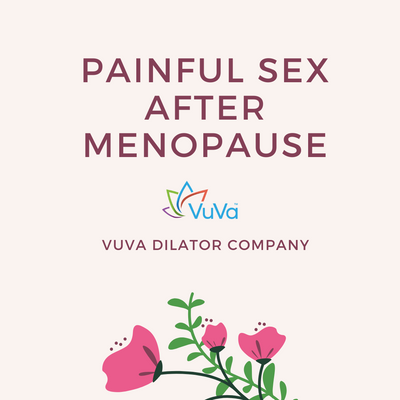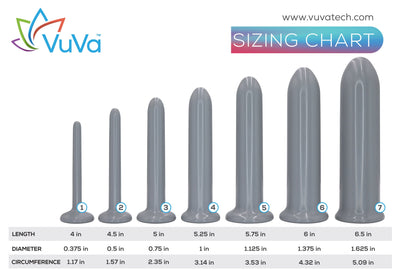
| Tara Langdale
How to Stop Pain During Sex: Tips for Comfort and Confidence
For many women, sex is meant to be a source of pleasure, intimacy, and connection. But when pain enters the picture, it can overshadow everything else—leaving you feeling frustrated, anxious, and even fearful of future encounters. If you’re searching for ways to stop pain during sex, you’re not alone. Painful sex, medically known as dyspareunia, is a common concern that affects countless women of all ages. The good news? There are proven strategies and innovative solutions that can help you reclaim comfort, confidence, and joy in your intimate life.
In this guide, we’ll explore the most common causes of pain during sex, practical tips for relief, and how tools like VuVa Magnetic Dilators—made in America—can play a vital role in your healing journey.
Table of Contents
-
Understanding Pain During Sex
-
Why Does Sex Hurt? Common Causes
-
Physical Triggers
-
Emotional and Psychological Factors
-
Medical Conditions
-
-
Communication: The First Step to Healing
-
Lubrication, Arousal, and Preparation
-
Pelvic Floor Relaxation and Gentle Stretching
-
Step-by-Step Guide to Using Vaginal Dilators
-
How VuVa Magnetic Dilators Stand Out
-
Combining At-home Care with Professional Help
-
Encouragement for Your Journey
-
Resources and Further Reading
1. Understanding Pain During Sex
Pain during sex can range from mild discomfort to severe, persistent pain that makes intimacy feel impossible. This pain may occur at the vaginal opening, deeper inside, or even around the vulva. It might be sharp, burning, stinging, or feel like deep pressure. For some, the pain is present every time; for others, it’s only in certain situations or positions.
No matter your specific experience, it’s important to know that you are not alone—and that pain is never something you should have to just “put up with.” Solutions are available, and you deserve to feel comfortable and confident in your body.
2. Why Does Sex Hurt? Common Causes
Painful sex can have a range of causes, and understanding them is key to finding the right solution.
A. Physical Triggers
1. Lack of Lubrication
-
Insufficient lubrication is one of the most common reasons for pain during sex. This can result from not enough arousal, hormonal changes (like menopause or breastfeeding), or certain medications.
2. Infections
-
Yeast infections, urinary tract infections (UTIs), or sexually transmitted infections (STIs) can cause burning, itching, and pain.
3. Allergies and Irritants
-
Soaps, lubricants, condoms, or laundry detergents with fragrances or chemicals can irritate sensitive skin.
4. Injury or Trauma
-
Childbirth, surgery, or injury to the pelvic region can cause pain, especially if there’s scarring or muscle tension.
5. Vaginismus
-
Vaginismus is an involuntary tightening of the muscles around the vagina, making penetration painful or impossible. Many women describe it as “hitting a wall” or experiencing intense burning or stinging.
B. Emotional and Psychological Factors
1. Anxiety and Stress
-
Worrying about pain, performance, or relationship issues can lead to muscle tension and reduced arousal.
2. Past Trauma
-
A history of sexual abuse, assault, or negative sexual experiences can trigger pain and involuntary muscle tightening.
3. Negative Beliefs About Sex
-
Growing up with messages that sex is shameful or dangerous can create subconscious tension and fear.
C. Medical Conditions
1. Endometriosis
-
This condition causes tissue similar to the uterine lining to grow outside the uterus, leading to pain during sex and menstruation.
2. Pelvic Inflammatory Disease (PID)
-
PID is an infection of the reproductive organs that can cause deep pelvic pain during sex.
3. Menopause and Hormonal Changes
-
Lower estrogen levels can lead to vaginal dryness, thinning of the vaginal walls, and increased sensitivity.
4. Vulvodynia and Skin Disorders
-
Chronic pain or discomfort of the vulva, or conditions like lichen sclerosus, can cause burning, stinging, and irritation.
3. Communication: The First Step to Healing
Open, honest communication with your partner is essential for stopping pain during sex. Let your partner know what you’re experiencing and how they can support you. This may include:
-
Slowing down or spending more time on foreplay
-
Trying different positions or techniques
-
Using plenty of lubricant
-
Taking breaks when needed
Remember, your comfort and well-being are just as important as your partner’s pleasure. Working together as a team can strengthen your relationship and make the healing process smoother.
4. Lubrication, Arousal, and Preparation
1. Prioritize Lubrication
-
Use a high-quality, water-based lubricant to reduce friction and discomfort. Consider silicone-based lubricants for longer-lasting moisture, especially if you experience dryness.
2. Focus on Arousal
-
Spend more time on foreplay to allow your body to become fully aroused and naturally lubricated. Explore different types of touch, kissing, or massage to discover what feels best.
3. Preparation and Mindset
-
Create a relaxing environment—dim lights, soft music, or a warm bath can help set the mood and reduce anxiety.
5. Pelvic Floor Relaxation and Gentle Stretching
The pelvic floor is a group of muscles that support the bladder, uterus, and rectum. If these muscles are too tight or reactive, they can cause pain during sex. Learning to relax and control these muscles is key to overcoming painful sex.
How to Relax the Pelvic Floor:
-
Practice deep breathing and mindfulness to calm your nervous system.
-
Try progressive muscle relaxation—tense and then release different muscle groups.
-
Gentle yoga or pelvic floor stretches can help relax tight muscles.
If you suspect you have pelvic floor dysfunction or vaginismus, working with a pelvic floor physical therapist can provide personalized guidance and support.
6. Step-by-Step Guide to Using Vaginal Dilators
Vaginal dilators are medical devices designed to gently stretch and relax the vaginal muscles over time. They are especially helpful for women with vaginismus, muscle tension, or those recovering from painful sexual experiences, childbirth, or surgery.
How to Use Vaginal Dilators:
-
Choose the Right Size:
Start with the smallest dilator and use plenty of lubricant. -
Find a Comfortable Position:
Lying on your back with knees bent or in a reclined position often works well. -
Relax and Breathe:
Take deep breaths and focus on relaxing your body. -
Insert Gently:
Insert the dilator slowly and gently, never forcing it. If you feel resistance, pause and let your body adjust. -
Hold and Breathe:
Once inserted, hold the dilator in place for several minutes, practicing deep breathing and relaxation. -
Progress Gradually:
As comfort increases, move up to larger sizes. Regular use, as recommended by your healthcare provider or therapist, can help desensitize the area and reduce pain.
7. How VuVa Magnetic Dilators Stand Out
Not all vaginal dilators are the same. VuVa Magnetic Dilators, made in America, offer a unique and innovative approach to stopping pain during sex:
1. Embedded Medical-Grade Magnets
VuVa dilators contain medical-grade magnets designed to promote increased blood flow and help relax the pelvic floor muscles during use. Enhanced blood flow can support healing, reduce muscle tension, and make dilation more comfortable and effective.
2. Gradual, Comfortable Progression
The dilators come in a range of sizes, allowing you to progress at your own pace and celebrate each milestone.
3. High-Quality, Body-Safe Materials
VuVa Magnetic Dilators are made from medical-grade, non-porous materials that are easy to clean and safe for long-term use.
4. Made in America
Supporting American manufacturing, VuVa dilators are crafted with care and quality assurance.
5. Empowerment and Confidence
Many women find that using VuVa Magnetic Dilators not only helps reduce pain, but also rebuilds confidence and comfort with their bodies.
Tips for Success:
-
Use as part of a treatment plan guided by a healthcare professional.
-
Start with short sessions and increase duration as comfort allows.
-
Combine with relaxation techniques and positive self-talk.
-
Track your progress and celebrate small victories.
8. Combining At-home Care with Professional Help
While at-home care can make a big difference, there are times when it’s best to consult a healthcare professional:
-
Persistent or severe pain with every attempt at sex
-
Burning, itching, or unusual discharge
-
Bleeding after sex
-
Pain that interferes with daily activities or relationships
-
No improvement with at-home care
A doctor, gynecologist, or pelvic floor physical therapist can help diagnose the underlying cause and recommend the right treatment plan for you.
9. Encouragement for Your Journey
Healing from painful sex is a journey, not a destination. It’s normal to feel frustrated or discouraged at times, but remember:
-
You are not alone—many women experience pain during sex and find relief with the right support.
-
Your pain is real and valid—never let anyone dismiss your experience.
-
You deserve pleasure, comfort, and confidence in your intimate life.
Celebrate every bit of progress, no matter how small. Be patient with yourself and trust the process.
10. Resources and Further Reading
Final Thoughts
If you’re searching for ways to stop pain during sex, know that you don’t have to settle for discomfort or fear. With practical strategies, open communication, and innovative tools like VuVa Magnetic Dilators—made in America—you can reclaim your comfort, confidence, and joy in intimacy. Don’t hesitate to reach out to a healthcare provider, pelvic floor therapist, or sexual health specialist. Relief is possible, and you deserve a fulfilling, pain-free intimate life.
This article is for informational purposes only and does not replace professional medical advice. Always consult a healthcare provider for diagnosis and personalized treatment.














